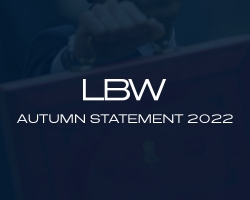Latest News
Employee (Including Directors) Loans
Employee (including directors) loans – personal tax perspective
It is well known that loans made by a company to any employee, which include a director, have taxation consequences. This particular note is to advise on changes to the rules regarding the beneficial loan regulations.
When a loan applies to an employee or director a notional interest charge is calculated based on the amount of the loan and the period it has been outstanding using a fixed percentage as prescribed by legislation. That rate is currently 4%. The loan itself does not have to be a formal arrangement it can simply be extracting money from a company which is treated as neither a salary nor a dividend. The most common treatment in this respect is a charge on the directors loan account (DLA) with the company.
Previously this charge has only been taxable if the balance on the loan account has exceeded £5,000 AT ANY TIME IN THE TAX YEAR. Thus going overdrawn on the loan account by £1 over £5,000 will mean a charge for the whole of the year will be taxable and not just the time the amount exceeded £5,000. Thus a loan of £4,999 for the whole year would not be charged but if the amount went over £5,000, even for one day, then the whole of the year would fall into charge.
The good news is that legislation is being brought in to increase this de-minimus limit to £10,000.
Employee (including directors) loans – company perspective - 1
The increase in the de-minimus is also good news for businesses.
The tax charge referred to above is regarded by H M Revenue & Customs as a benefit in kind and is of a type that attracts Class 1A National Insurance. The current rate is 13.8% and whilst this is deductable for corporation tax, the net cost is still a burden and also involves paperwork in terms of the requirement to complete an annual benefit in kind return form, a P11D.
Employee (including directors) loans – company perspective - 2
There are changes currently being consulted on at present on the question of the charge to the company on overdrawn loan accounts where there are no de-minimus limits.
Whilst these changes are still being consulted on it would be sensible to be aware of H M Revenue & Customs proposals in this area.
The current position is that if there is a balance on a director’s loan account and that balance is outstanding at the company year end, then a charge arises under Section 455 of the Corporation Tax Act 2009/2010. This charge requires the company to “deposit“ with HM Revenue & Customs, an amount equal to 25% of the outstanding amount. The sum in question is due for payment on the normal corporation tax due date for the year in question i.e. 9 months after the year end.
We have referred to the charge as being a deposit because the sum in question will be either not payable or repaid once the loan account reverts to a credit balance depending on the timing of the repayment.
The first of these two situations is the repayment of the loan before the due date for payment. In these circumstances the charge is not payable altogether.
The second situation arises when the loan is repaid after the charge has been paid. In these circumstances the charge is repayable 9 months after the end of the accounting year in which the loan is repaid.
H M Revenue & Customs have recognised that the current system is open to abuse by way of the director repaying the loan one day and thus claiming the relief only to borrow the money back again the next day i.e. take out a new loan. Legislation will be introduced to counter this by ignoring any repayments where a new loan is taken out in the next 30 days or regardless of the 30 day rule, where there is an intention or arrangement in place to borrow the money again at a later date.
Thankfully H M Revenue & Customs will introduce a relief such that if the loan is repaid by way of money which is or has been subject to tax (usually a salary bonus or a dividend) then this will be treated as a genuine repayment and will not be subject to the 30 day rule.
As indicated above this matter is still the subject to consultation but H M Revenue & Customs views are generally put into action and we shall confirm this once it has been made known.
Last modified on




